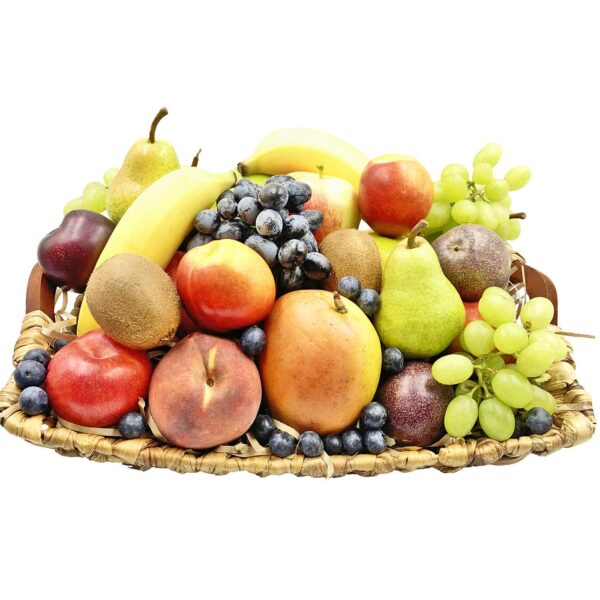How Much Fruit Should You Eat Every Day?

When it comes to healthy eating, fruit is often hailed as nature’s candy – a delicious, nutritious way to add essential vitamins, minerals, and fibre to your diet. But with so many varieties and differing advice, you might wonder: “How much fruit should I eat every day?”
The short answer is: it depends. Various factors such as age, gender, activity level, and overall health goals influence how much fruit is ideal for you. Below is some information and guidelines to find out how much fruit you should eat for a healthy balanced diet.
Why Is Fruit Important?
Fruit is an essential part of a balanced diet and our Fruit Baskets are the perfect gift to give that is both good for your taste buds and health. Before we dive into the specific amounts of fruit you should consume, it’s important to understand why fruit is such an essential part of a balanced diet. Here’s what fruit brings to the table:
-
Vitamins and Minerals: Fruits are packed with essential vitamins such as Vitamin C (in citrus fruits), Vitamin A (in mangoes), potassium (in bananas), and folate (in avocados). These nutrients help boost your immune system, maintain skin health, improve vision, and regulate body functions.
-
Fibre: Fruit is an excellent source of dietary fibre, which is crucial for digestive health. Fibre helps prevent constipation, reduces cholesterol levels, and stabilizes blood sugar, keeping you feeling fuller longer.
-
Antioxidants: Many fruits, such as berries and citrus fruits, are rich in antioxidants. These compounds help fight free radicals in the body, reducing inflammation and potentially lowering the risk of chronic diseases like heart disease and cancer.
-
Hydration: Some fruits, especially water-rich ones like watermelon, oranges, and cucumbers, contribute to your daily fluid intake, helping you stay hydrated throughout the day.
How Much Fruit Is Recommended?
Here is what some leading health organisations have to say about amount of fruit you should eat:
-
U.S. Department of Agriculture (USDA): The USDA’s MyPlate dietary guidelines recommend that adults consume 1.5 to 2 cups of fruit per day. The exact amount depends on factors such as age, gender, and activity level. For example, women aged 19-30 are advised to consume around 2 cups of fruit daily, while women aged 31-50 should aim for 1.5 cups.
-
World Health Organization (WHO): WHO recommends consuming at least 400 grams (about 5 servings) of fruits and vegetables per day. They emphasize a balanced mix of fruit and vegetables to ensure an intake of various nutrients.
-
Dietary Guidelines for Australians: Australian health guidelines suggest 2 servings of fruit per day for adults. A standard serving is typically a medium-sized piece of fruit, such as an apple or orange, or a cup of diced fruit.
While these recommendations provide a general framework, individual needs vary. Factors such as physical activity level, body size, and health conditions might require adjustments to these guidelines.
Note that dried fruit is denser in calories and sugar than fresh fruit, so portion sizes are smaller. Likewise, fruit juices (if they are 100% juice without added sugar) can count toward your daily intake, but whole fruits are preferred due to their fibre content. See our collection of premium Fruit Baskets that have enough fruit for the whole family.
Factors Affecting Fruit Intake
There’s no one-size-fits-all answer to how much fruit you should eat, as individual factors come into play. Let’s explore the most significant variables:
-
Age: Children need less fruit compared to adults, with recommended servings ranging from 1 cup for younger children to 2 cups for teenagers. Seniors, depending on activity level and health conditions, may also need less fruit compared to younger adults.
-
Activity Level: If you’re highly active, your body will require more energy and nutrients. Athletes or individuals with physically demanding jobs may benefit from consuming more fruit for the quick energy and vitamins it provides. On the other hand, individuals with a sedentary lifestyle might need to be more cautious with calorie-dense fruits to avoid overconsumption.
-
Health Goals: Your fruit intake should align with your health goals. If you’re aiming to lose weight, opting for lower-calorie, high-fibre fruits (like berries or apples) can help you feel fuller without adding too many calories. If you have diabetes or other blood sugar-related conditions, it’s important to monitor your fruit intake, especially with high-sugar fruits like grapes, bananas, or mangoes. Consulting a healthcare professional or nutritionist can help create a personalized plan.

Can You Eat Too Much Fruit?
Given its high nutrient content, it’s hard to imagine that eating too much fruit could be problematic. However, as with anything, moderation is key. Here are a few reasons why you should balance your fruit intake:
-
Sugar Content: While the sugar in fruit is natural and healthier than processed sugars, it’s still sugar. Consuming too much fruit can lead to a high intake of fructose, which may affect blood sugar levels and potentially contribute to weight gain if consumed in excess.
-
Calorie Intake: While fruit is relatively low in calories, consuming large portions of calorie-dense fruits (such as bananas, grapes, or avocados) can add up. This might be a concern for those aiming to lose weight or maintain a certain caloric intake.
-
Fibre Overload: While fibre is essential for good digestion, consuming too much at once can lead to bloating, gas, and other digestive discomforts. This is especially true if your diet isn’t already high in fibre.
The key is to enjoy fruit as part of a balanced diet. Pair your fruit intake with vegetables, lean proteins, whole grains, and healthy fats to ensure a well-rounded approach to nutrition.
Variety Is Key: The Rainbow of Fruits
Eating a wide variety of fruits ensures that you get a range of nutrients. Different fruits offer different vitamins and minerals, so eating a “rainbow” of colours can help you maximize your nutrient intake. Our Fruit Baskets ensure you or whoever you are sending the basket to, are getting all colours of the rainbow with our variety of seasonal fruits. Here’s a guide to what each colour group offers:
-
Red Fruits: Examples include strawberries, raspberries, cherries, and watermelon. These fruits are rich in antioxidants, particularly anthocyanins and lycopene, which promote heart health and reduce inflammation.
-
Orange and Yellow Fruits: Think oranges, mangoes, and pineapples. These fruits are loaded with Vitamin C and beta-carotene, promoting healthy skin, vision, and immune function.
-
Green Fruits: Green fruits like kiwis, green apples, and grapes provide a good source of fibre, folate, and potassium. They support digestive health and help regulate blood pressure.
-
Blue and Purple Fruits: Blueberries, blackberries, and plums are high in antioxidants that support brain health and may protect against aging and cognitive decline.
-
White and Brown Fruits: Bananas, pears, and apples provide a mix of vitamins, potassium, and soluble fibre, which aid digestion and maintain heart health.
Simple Ways To Incorporate More Fruit Into Your Diet
If you find it challenging to get enough fruit in your daily diet, here are some practical tips to make it easier:
-
Start Your Day with Fruit: Add sliced fruit to your breakfast – think bananas on oatmeal, berries in yogurt, or a side of grapefruit with eggs.
-
Snack Smart: Replace processed snacks like chips or candy with fruit. Keep a bowl of fresh fruit on your kitchen counter for easy access, or pack dried fruit for on-the-go snacking.
-
Blend It Up: Smoothies are an easy and delicious way to pack multiple servings of fruit into one drink. Combine a variety of fruits with leafy greens, protein powder, or nuts for a nutritious boost.
-
Add Fruit to Salads: Fruits like apples, pears, berries, and oranges add a fresh and sweet twist to salads. Pair them with leafy greens, nuts, and a light vinaigrette for a flavourful meal.
-
Incorporate Fruit into Desserts: Substitute sugary desserts with fruit-based alternatives. Think baked apples with cinnamon, frozen grapes, or a simple fruit salad with a sprinkle of nuts and honey.
Conclusion: Finding Your Perfect Balance
So, how much fruit should you eat every day? While general recommendations suggest 1.5 to 2 cups per day for adults, the ideal amount depends on individual factors like age, activity level, and health goals. By incorporating a wide variety of fruits into your diet and paying attention to serving sizes, you can enjoy the many health benefits fruit offers without overdoing it.
See our wide range of fresh fruit baskets and treat yourself to a wide range of seasonal, sweet and juicy fruits, or give the gift of summer to friends and family by sending them a surprise fruit basket!
OUR BEST SELLING FRUIT BASKETS!




